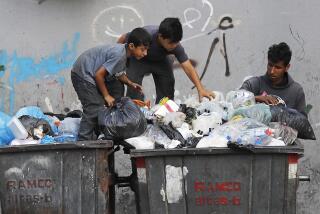Somalis Lose Cash Lifeline
- Share via
MOGADISHU, Somalia — Somalia is a country that operates on small handouts: $50 from a son in San Diego to his mother; $100 from a nephew in Dubai to an uncle; $200 from a daughter in Dallas to her mother caring for eight other children.
These small sums are sent through Mogadishu-based Al Barakaat and companies like it, adding up to hundreds of millions of dollars a year.
The money sustains much of the country, and Al Barakaat has used the cash flow to become something akin to a conglomerate in Somalia. It operates cell phone companies and a private postal service and has been planning to open a Pepsi bottling plant, the first here since 1990.
Al Barakaat’s funds were frozen Wednesday by President Bush, along with those of 61 other organizations and individuals. The company plays such a central role in Somali life that people here fear that closing the operation could trigger starvation on the order of the famine a decade ago that killed thousands of people.
“This will recall what happened in 1992,” Al Barakaat Deputy General Manager Abas Adbi Ali said in an interview Wednesday, just before officials in Washington released their latest list of organizations and individuals suspected of financial links to terrorists. “A whole lot of people would lose their lives.”
A name matching Ali’s is on the new U.S. document.
The naming of Al Barakaat and several Somali nationals could add to Somalia’s image as a lawless land ruled by warlords and religious extremists.
Abdiqassim Salad Hassan, president of Somalia’s fledgling transitional government, the country’s first central authority since the ouster of dictator Mohamed Siad Barre in 1991, denies that Somalia harbors terrorists.
“It saddens me that people are making false allegations against my country,” he said this week. “If there are local or international terrorists in Somalia, we will deal with them.”
Al Barakaat began in the early 1980s as an informal operation that transferred small sums of money from the thousands of Somali migrant laborers working in Persian Gulf countries. The company’s operations exploded in the 1990s as hundreds of thousands of Somalis fled famine, civil war and the collapse of the Somali state and ended up living and working in cities across the globe.
In the United States, Al Barakaat offices soon appeared in strip malls in San Diego, Minneapolis and Columbus, Ohio.
Remittances from abroad now account for the largest source of hard currency entering Somalia. Without them, Somalis may not be able to feed themselves, experts say. A U.N. report found that remittances accounted for 40% of the income in some Somali towns.
A Somali scholar at the University of Minnesota is concerned that the freezing of assets will “create problems for very poor people” in countries such as Somalia.
“I can tell you without a doubt it will have a catastrophic effect on people who are dependent on small amounts sent from the United States,” said Abdi Samatar, a professor of geography who has written extensively on Somalia.
Samatar said it is “absolutely legitimate” to target people engaged in illegal activities. “But using a sledgehammer to make the vulnerable all the more destitute is not what we are all about.”
Dozens of remittance companies have sprung up in Somalia, but Al Barakaat and a few competitors have fine-tuned their operations. They now serve as banks to a range of customers, including poor Somalis, aid agencies and businesses.
The remittance system works on trust and verbal assurances. A Somali living in the United Arab Emirates, for instance, may go to Al Barakaat’s Dubai office and request that a company transfer $500 to a relative in Mogadishu. Al Barakaat employees in Mogadishu receive an almost instant e-mail on the transfer. Using Somalia’s extensive cellular telephone and clan network, the employees put out word that the recipient should come to collect the money, paid in dollars, at the Al Barakaat office.
In the Mogadishu office on Wednesday, Ali, the deputy general manager, showed two American journalists around. He insisted that the first time he heard of Al Qaeda, Bin Laden’s terrorist network, was after the Sept. 11 attacks.
He expressed his heartfelt condolences to the U.S.
*
Times staff writer Chuck Neubauer in Chicago contributed to this report.
More to Read
Sign up for Essential California
The most important California stories and recommendations in your inbox every morning.
You may occasionally receive promotional content from the Los Angeles Times.













